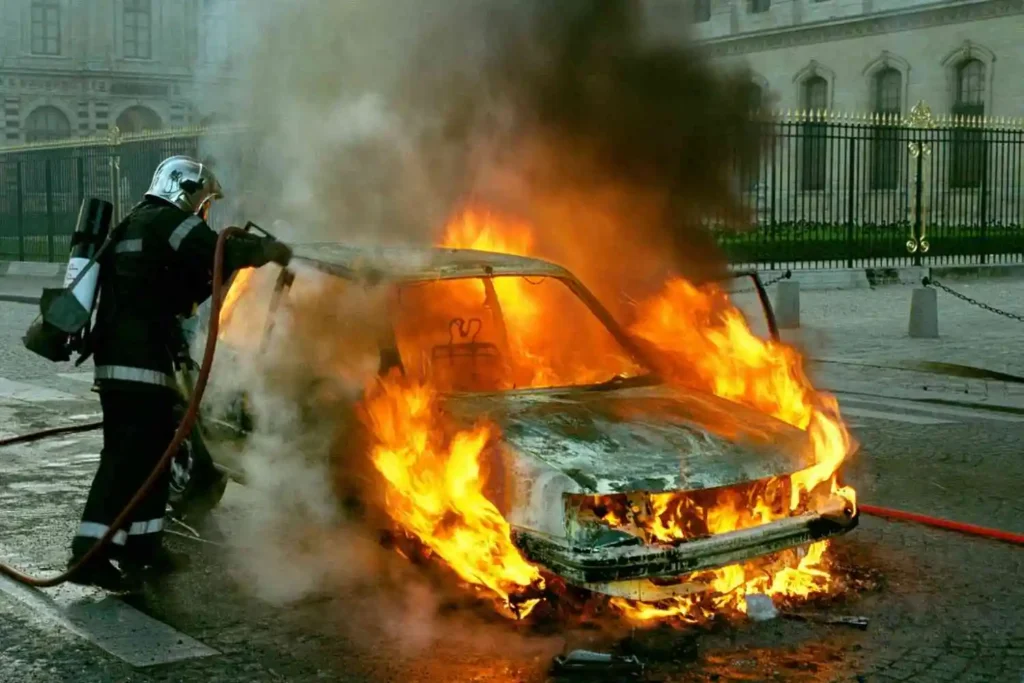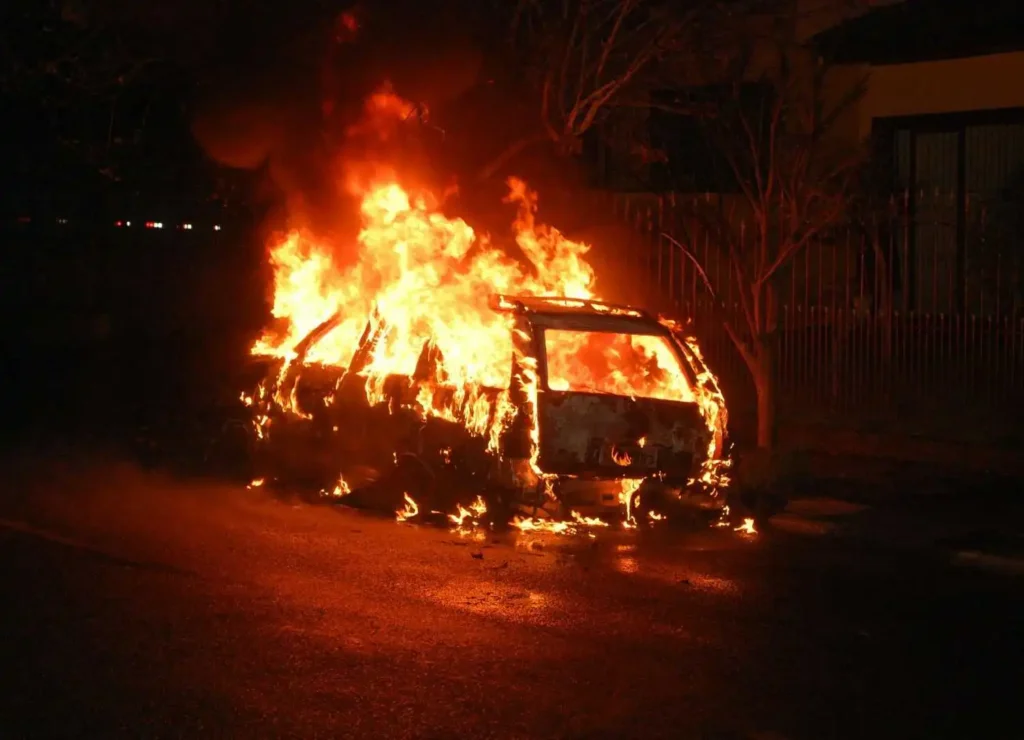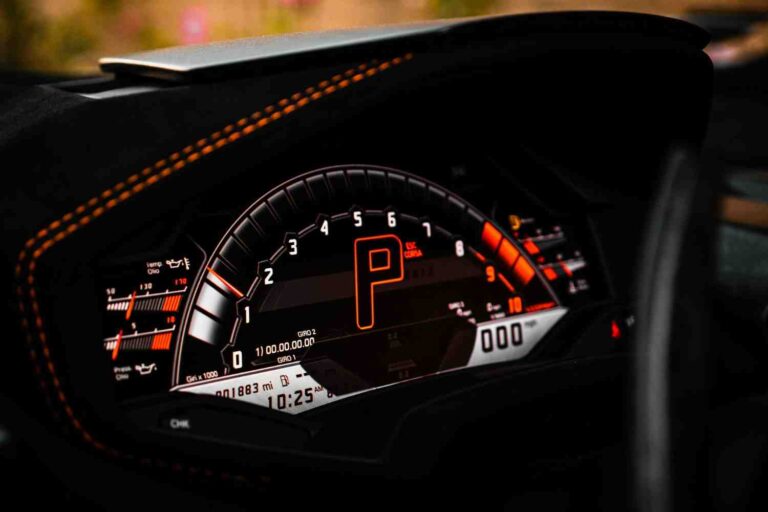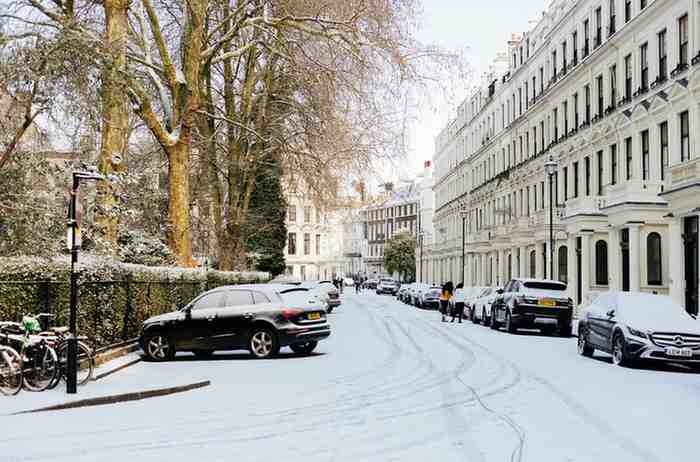Imagine your car suddenly catching fire. The shock fades, and you wonder if your insurance will help. Knowing your coverage can give you peace of mind.

We’ll look into car insurance and what happens if your car catches fire. We’ll cover the different types of coverage and the claims process.
This will help you make smart choices and protect your finances.
Understanding Car Insurance Coverage
Car insurance offers several types of coverage for car fires. Knowing what each policy covers is key to protecting your vehicle.
Types of Car Insurance Policies
The main types of car insurance include:
- Liability coverage: This covers the harm and losses you inflict on other people in the event of an accident.
- Collision coverage: This covers the expense of repairing your car in the event that it collides with another object is covered by collision coverage.
- Comprehensive coverage: This provides protection against non-collision related damages, such as fires, theft, vandalism, and natural disasters.
What Does Comprehensive Coverage Include?
Comprehensive coverage is key for car fires. It protects your vehicle from many incidents, including:
- Fires, whether caused by mechanical issues or external sources
- Theft and vandalism
- Natural disasters, such as storms, floods, and hail
- Falling objects, like tree branches or debris
- Animal collisions
If your car catches on fire, comprehensive coverage can help pay for repairs or replacement, depending on the damage.
| Coverage Type | What It Covers | Relevance for Car Fires |
|---|---|---|
| Liability | Damages and injuries caused to others | Low |
| Collision | Repairs to your vehicle after a collision | Low |
| Comprehensive | Damages from non-collision events, like fires, theft, and natural disasters | High |

Causes of Car Fires
Understanding why car fires happen is key. They can be caused by electrical problems, mechanical issues, or even arson. Knowing these causes helps us prevent fires and be ready if one happens.
Electrical Issues
Electrical problems are a top reason for car fires. Faulty wiring, short circuits, or broken parts like the alternator can cause fires. When electrical systems get too hot, they can start fires in the car.
Mechanical Problems
Mechanical failures, like engine or transmission problems, can also lead to fires. Leaks of oil or fuel can ignite when they meet hot parts. Keeping your car well-maintained can lower this risk.
Arson
Arson, though rare, is another reason for car fires. Vandalism or targeted attacks can start fires. These actions are dangerous for everyone involved.
Knowing why car fires happen helps us protect our vehicles and ourselves. By staying alert and keeping up with maintenance, we can avoid fires. We’ll also be ready if a fire does happen.
Steps to Take After a Car Fire
If your car catches fire, get out fast and call 911. After the fire is out and it’s safe, document everything well. This helps with your insurance claim.
Safety First: Evacuate and Call Emergency Services
Your safety is most important when your car is on fire. Get out quickly and call 911. Firefighters will come to put out the fire and make sure you’re safe.
Document the Incident for Insurance Claims
- Photograph the damage from every angle.
- Save any melted or charred parts safely.
- Get a police report about the fire.
- Collect statements from anyone who saw the fire.
It’s key to document the fire well for your insurance claim. Your case will be stronger if you have more evidence.
| What to Do | Why It’s Important |
|---|---|
| Evacuate and call 911 | Ensure your personal safety and prompt emergency response |
| Take photos of the damage | Document the extent of the damage for your insurance claim |
| Gather physical evidence | Provide supporting materials to demonstrate the cause of the fire |
| Obtain a police report | Officially record the incident and its details |
| Collect witness statements | Gather additional information that could aid your insurance clai |
“Taking the proper steps after a car fire can make all the difference in getting your insurance claim approved and your vehicle repaired or replaced.”
Filing an Insurance Claim for a Car Fire
When your car catches fire, dealing with the insurance claim can be tough. But, it’s key to get your losses covered and move forward. We’ll look at what you need to file a car fire insurance claim smoothly.
Required Documentation and Evidence
To file a successful car fire insurance claim, you’ll need some important documents and evidence:
- Images or videos of the car damaged by the fire that show the damage from various perspectives.
- A detailed written account of the incident, including the date, time, and location of the fire, as well as any potential causes or contributing factors.
- Repair estimates from reputable auto shops, outlining the necessary repairs and associated costs.
- Evidence of ownership, like the title or registration of the car.
- Copies of any police reports or fire department records related to the incident.
- Receipts for any immediate expenses incurred, such as rental car costs or towing fees.
By collecting and submitting this documentation for your car fire claim, you’ll help your insurance provider understand your situation. They can then decide on the right coverage and compensation for you.
| Required Document | Purpose |
|---|---|
| Photos/Video of Damage | Visually demonstrate the extent of fire damage to your vehicle |
| Written Incident Account | Provide detailed information about the fire, including potential causes |
| Repair Estimates | Determine the cost of necessary repairs to your vehicle |
| Proof of Ownership | Establish your legal ownership of the damaged vehicle |
| Police/Fire Department Records | Corroborate the details of the incident and any official findings |
| Expense Receipts | Justify any immediate costs incurred due to the fire |
With all this documentation and evidence, you’re ready to file your filing car fire insurance claim. This ensures your insurance provider has everything they need to process your claim quickly and fairly.
My Car Caught on Fire Will My Insurance Cover It?
If your car catches on fire, you’ll be relieved to know that your car insurance may cover the damages. The key is having the right type of car insurance policy, specifically comprehensive coverage.
Comprehensive coverage is designed to protect your vehicle from a wide range of perils, including fires.
When it comes to car fire insurance coverage, the good news is that comprehensive coverage has you covered. This type of policy is meant to protect your vehicle from incidents that are out of your control, like natural disasters, theft, vandalism, and yes, even car fires.
So, if your car is damaged or destroyed by a fire, your comprehensive coverage should help pay for the repairs or replacement of your vehicle.
The extent of the coverage for car fires will depend on your policy’s specifics and limits. It’s crucial to review your coverage details to understand what is and isn’t covered.
But in general, comprehensive coverage is the type of policy you’ll rely on if your car falls victim to a fire.
| Coverage | Covers Car Fires? |
|---|---|
| Liability Coverage | No |
| Collision Coverage | No |
| Comprehensive Coverage | Yes |
In summary, will insurance cover a car fire? The answer is yes, as long as you have comprehensive coverage. This important policy feature is designed to protect your vehicle from unexpected events like fires, ensuring you’re covered when the unexpected happens.
“Comprehensive coverage is a must-have for any driver who wants to be prepared for the unexpected, including car fires.”
Factors Affecting Insurance Coverage
Comprehensive coverage is usually what you count on for a car fire. But, some factors can change how much you get back. Knowing about policy limits, deductibles, and exclusions helps you deal with claims better.
Policy Limits and Deductibles
Your policy limits show the most your insurance will pay for a claim. The deductible you choose also matters. It’s the amount you pay first before your insurance helps.
It’s smart to check your policy before a fire happens. In this manner, you are aware of the possible out-of-pocket expenses you can then plan better.
Exclusions and Limitations
Insurance policies often have exclusions and limits. For instance, some might not cover fires caused by arson or mechanical issues. Knowing what your policy excludes is key to avoid surprises if you need to claim.
Understanding these factors helps you handle claims better. You’ll get the most from your policy.
Dealing with Insurance Claim Denials
Dealing with car insurance can be tough. Sometimes, even careful drivers face a denied claim after a car fire. It’s upsetting, but you have ways to appeal or negotiate with your insurance.
Appealing an Insurance Claim Denial
If your claim is denied, start by looking at the reasons given. Check your policy and any documents from the incident. This helps find any mistakes that might have caused the denial. Then, you can appeal.
- Ask your insurance for a detailed explanation of the denial in writing.
- Collect more evidence, like photos, repair estimates, and witness statements, to support your claim.
- Write a formal appeal explaining why you think your claim should be approved and include your evidence.
- Be patient and persistent during the appeals process. It might take time for your insurance to review again.
Negotiating with the Insurance Company
If appealing doesn’t work, you might need to negotiate with your insurance. This can be tricky, but the right approach might get you the coverage you need.
- Know what your policy covers and what it doesn’t, and your rights as a policyholder.
- Talk to your insurance company clearly and professionally. Avoid being confrontational.
- Think about getting help from a public adjuster or insurance attorney. They can negotiate for you and make sure you get a fair deal.
- Be open to compromise, but don’t accept a deal that’s not fair or doesn’t cover the damage from the car fire.
Dealing with a denied claim can be tough and stressful. But knowing your rights and taking action can help you get the coverage you need to fix or replace your car after a fire.
| Appealing Insurance Claim Denial | Negotiating with Insurance Company |
|---|---|
| Review denial reasons and policy details Gather additional evidence Submit a formal written appeal Persist through the appeals process | Understand policy coverage and limits Communicate clearly and professionally Consider assistance from a public adjuster or attorney. Be willing to compromise, but don’t accept an unfair settlement |
“A rejected insurance claim shouldn’t mean the end of the world.”. Explore your options and fight for the coverage you deserve.”
Prevention and Maintenance Tips
We can’t always stop car fires, but we can lower the risk. Regular checks and care for our car’s electrical system are key. They help avoid fires that could be very dangerous.
Here are some tips to keep your car safe from fires:
- Regularly inspect the electrical system: Look for frayed wires, loose connections, and wear. Fix any problems quickly to avoid fires.
- Keep an eye on the battery’s condition by keeping it clean and making sure all the connections are secure. Replace it if it’s corroded or not working well.
- Replace worn-out parts: Don’t wait to replace hoses, belts, and other parts that could fail and cause a fire.
- Maintain the fuel system: Check the fuel lines, connections, and pump for leaks or issues that could start a fire.
- Stay up-to-date with car inspections: Get regular tune-ups and inspections to catch and fix fire hazards early.
By following these tips, we can lower the risk of car fires. This makes driving safer for everyone.
“An ounce of prevention is worth a pound of cure when it comes to car fires.”
Conclusion
If our car catches on fire, our comprehensive car insurance should help. It covers repairs or a new car. Knowing how to file a claim and taking care of our car are key steps.
Understanding our insurance coverage is vital. We need to gather the right documents and evidence. Keeping our car in good shape also helps.
After a car fire, we should contact our insurance company first. We must document everything well. Support services and resources are also accessible.
Learn more with progressive
FAQ
My car caught on fire will my insurance cover it?
Yes, your car insurance should cover a car fire. You need the right coverage. Comprehensive coverage is usually the one that protects against fires and other damage.
What are the common causes of car fires?
Car fires can be caused by many things. This includes electrical problems, mechanical issues, and even arson. Knowing why car fires happen can help you prevent them and be ready for insurance claims.
What should I do if my car catches on fire?
If your car catches on fire, get out and call emergency services right away. After the fire is out, take photos and gather information for your insurance claim.
What documentation and evidence do I need to file a car fire insurance claim?
To file a claim for a car fire, you’ll need certain documents. This includes photos of the damage, repair estimates, and details about the incident.
How can I prevent car fires?
You can’t always prevent car fires, but you can lower the risk. Regular vehicle checks, especially of the electrical system, can help avoid fires.
What factors can affect my insurance coverage for a car fire?
Comprehensive coverage usually covers car fires. But, policy limits, deductibles, and exclusions can affect how much you get. These factors can change what your insurance pays out.
What can I do if my car fire insurance claim is denied?
If your claim is denied, you have options. You can appeal or negotiate with your insurance. This might involve more documentation or addressing their concerns.
Bike vs Car Insurance




[…] Also read: My Car Caught On Fire Will My Insurance Cover It? […]
[…] Are you curious about: My Car Caught On Fire Will My Insurance Cover It? […]